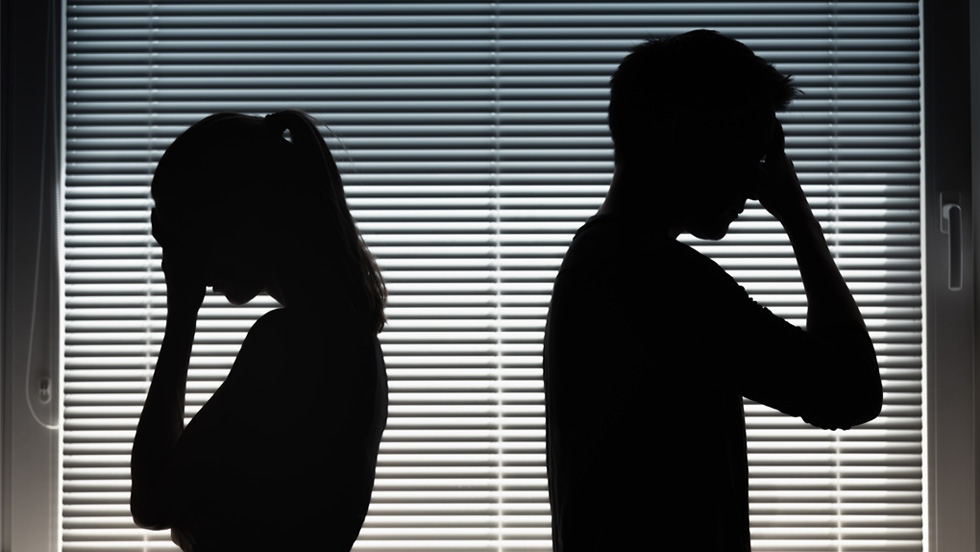
Tracing the long-term impact of daily arguments between spouses.
For people dealing with depression, even the smallest disagreement can become a difficult setback. But for marriages in which one or both spouses are prone to depression, everyday tension can have deep, far-reaching implications.

Dr. Marini sits at a table with two students.
As relationship researchers, Christina Marini ’11, PhD, assistant professor of psychology in the Gordon F. Derner School of Psychology, and her collaborator Stephanie Wilson, PhD, assistant professor of psychology at Southern Methodist University, spend a lot of time thinking about how our social interactions impact our health and well-being. “We know that negative marital dynamics undermine mental health, but we know surprisingly little about what daily social exchanges, patterns and behaviors actually account for these longer-term associations,” Dr. Marini explained.
Their recent article, “The days add up: Daily marital discord and depressive reactivity linked to past-month depressed mood and marital risk across 10 years” (Journal of Social and Personal Relationships, April 2023), analyzed data from the Midlife in the United States: A National Longitudinal Study of Health & Well-Being (MIDUS) project to unearth the dynamics that create—and even sustain—depression in marriages. ¹
Together, Drs. Marini and Wilson reviewed self-reporting questionnaires and narratives gathered in two waves by the MIDUS project, covering a period of 10 years. Their work is the first study to link relationship habits to both ongoing and potential shifts in depression over time. “This type of multi-timescale research design is becoming more and more common within the social sciences,” Dr. Marini said. “It is a really rich way of digging deeper to see how daily patterns map onto longer-term patterns of change or stability across many contexts. In this study, we were able to identify the connection between those daily patterns and more entrenched feelings of how people perceive their relationships.”
Nightly telephone interviews conducted by MIDUS asked participants to rate how often they had felt “so sad nothing could cheer you up,” “hopeless,” “that everything was an effort” and “worthless.” Participants also reported on seven types of stressors from the day, including arguments they had both had and avoided with their spouse. From this data, Drs. Marini and Wilson devised a monthly measurement that aggregated daily interpersonal stress between spouses.
On average, the pair found that participants’ depressed mood rose on days when they had an argument or tension with their spouse (defined as depressive reactivity to marital discord). The frequency of these occurrences indicated higher levels of depression for the month overall. Additionally, individuals with greater depressive reactivity to their daily marital issues showed a greater increase in depressed mood over 10 years—a finding that held true even when controlled for the amount of discord. Overall, these findings support the previously untested idea that everyday marital discord and corresponding reactivity may “mobilize slower-moving shifts in depression across an entire decade.”
While prior research on depression in partnerships has generated similar results, this study demonstrates the impact of “discord-related daily depressive reactivity” beyond existing chronic depression or general stress. The cognitive biases associated with depression can negatively skew a person’s interpretation—and memory—of their partner’s emotional expressions and actions, which can prolong symptoms of depression. In turn, according to the authors, this can “exacerbate marital problems and encourage more fatalistic thinking about the relationship.”
Dr. Marini’s interest in understanding the ways relationships can both support and drain us guides her interpretation of the study’s results. The impact of heightened depressive reactivity was “astonishing,” she reports, and should point the way toward new developments in therapeutic interventions. “Even if we can’t reduce the amount of conflict that couples experience, we can help them become less reactive when it does occur,” she said. “This might be protective for their mental health and well-being in the long run.”
Biography
Christina Marini ’11, PhD, is an assistant professor in the Gordon F. Derner School of Psychology. The overarching focus of her research is how intimate partners influence each other’s health and well-being, exploring subjects such as couple relationships, stress and coping, adulthood and aging, caregiving, and military and veteran families. Dr. Marini coauthored the book Serving Military and Veteran Families: Theories, Research, and Application, published by Routledge in 2024.
1 Wilson, S. J., & Marini, C. M. (2022). The Days Add Up: Daily Marital Discord and Depressive Reactivity Linked to Past-Month Depressed Mood and Marital Risk across 10 Years. Journal of Social and Personal Relationships, 40(4), 1172–1193. doi:10.1177/02654075221116277